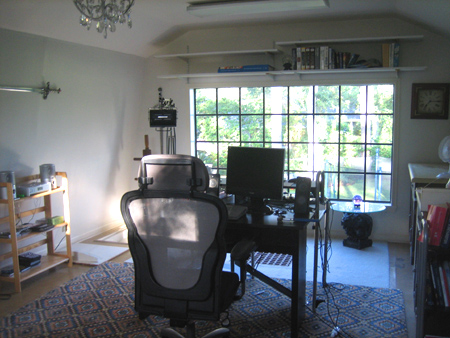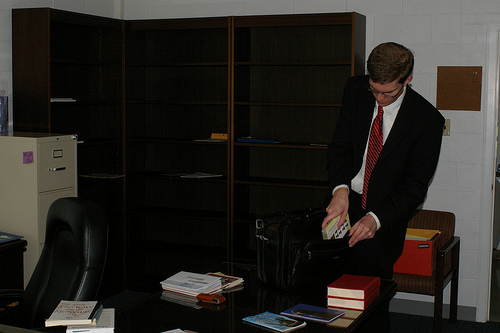
There are two common kinds of advice I’ve heard given to people who don’t like their jobs. One is “suck it up,” which is pragmatic but not very inspiring. The other is “then get a different job,” which is inspiring but not always pragmatic. In this post, I won’t attempt to untangle the question of when it is or isn’t a good idea to leave your job, although sometimes that may be the best call. Instead, let’s say that you’ve decided you want to stay at your current job, and the only problem is, your job is a drag. Is it possible to be happy even if you’re spending 40 hours a week (or more) doing something you don’t like? Often it is. Other people are living happy lives despite lousy jobs. Why not you?
1. Remember Why You’re There
It’s nice to have a job, to be paid, and to have something to do. You might have other reasons for your job as well. Getting in touch with them dispels the false idea that we’re forced to be at work. Sure we need to work to get money to live (most of us, anyway). But there are people who don’t have the work or the money, and it’s nice not to be in that situation.
2. Know What You Don’t Like
As with most situations where we have negative emotions, one of the first and most important steps is mindfulness. When we find ourselves reacting negatively to a situation and want to change that reaction, it helps (a lot) to figure out where the reaction is coming from. Sometimes the answers are fairly obvious (“I don’t like it when my boss comes into my office every five minutes to ask about something”) and sometimes they’re may be something that you haven’t consciously considered before (“Come to think of it, it’s this depressing room that’s bothering me the most.”) If your job isn’t satisfying to you, there’s probably more than one reason. Pay attention to your thoughts whenever you’re feeling most unhappy: this leads you to the causes.
3. Change the Details
Improving your actual job situation–negotiating a raise, getting transferred to another group, trading some responsibilities, etc.–is too big a topic to go into in detail here, but it’s well worth thinking about. Would better tools help you enjoy your work more? Creating more social ties with coworkers? Making your work environment more welcoming? Taking on more responsibilities? Sharing certain jobs with coworkers?
It’s not unsual to feel as though certain kinds of situations are unchangeable, only to find out that a simple request or a new approach can change them in important ways. Look for these kinds of opportunities.
4. Fix Broken Ideas
As human beings, we have evolved amazingly sophisticated mental systems for making ourselves miserable. Very often, we tell ourselves false (though true-sounding) stories in an ongoing mental commentary. Some examples are things like “She should have done that last week,” “I’m completely miserable here,” “This project is doomed to fail,” and “They all think I’m an idiot for forgetting about the presentation.” These broken ideas can be repaired by restating them as factually as possible, for instance “It would have been easier for me if she had done that last week, but she’s not always going to do things the way I’d like.” Broken ideas create tension and stress. Repairing them allows us to let go of negative ideas that are dragging us down.
5. Get Into Flow
The ultimate way to enjoy your work is to learn to get into a state of flow with it as often as possible. Flow is a state in which you’re challenged, but within your abilities; you’re able to focus without distractions or interruptions on a task; and you’re getting moment-to-moment feedback of some kind on how well you’re doing. Being in flow means being absorbed in the work and losing track of time because you’re so interested and involved. Not everything can be done in flow, but while it may be easier to imagine it working for surfers and violinists, it also can work beautifully if you’re washing dishes, filling out paperwork, or repairing a lawnmower.
Some tips on getting into a flow state are here. The most useful thing I can say about flow in a single sentence is that it only happens when you’re focusing on one thing, not when you’re allowing yourself to be distracted, or when you’re stopping and starting different tasks. Having fun while working, surprisingly, turns out to be easiest when you are working hard and efficiently.
6. Find a Goal
Flow experiences and most other kinds of enjoyable activity require having a goal (or goals). Just responding to things as they come is not generally an effective way to seek happiness. Even if your goal is just to improve your turnaround time by 5 minutes or to find something positive to say in every customer interaction, it allows you to focus and think about it rather than about boring, distracting, or tedious details that might otherwise take up your attention.
If you’re not happy at work it may be that you should consider another kind of job, but whatever position you have, there will very likely be parts you don’t enjoy. By remembering your reasons, knowing what’s behind your dissatisfaction, making the most of your work environment, fixing broken ideas, aiming to get into flow, and finding goals, you’ll have the best chance of being happier with your work … and taking those positive feelings with you when you go home.
Photo by chinogypsie




